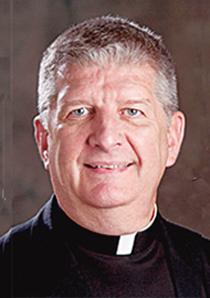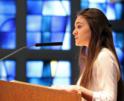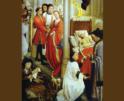
Faith
... the reader must be able to read the text publicly. To do this properly, they need to have a familiarity with the text, that is review and prepare in advance of the liturgical assignment.

O'Grady
''Sacred scripture is of the greatest importance in the celebration of the liturgy. For it is from scripture that lessons are read and explained in the homily, and psalms are sung; the prayers, collects, and liturgical songs are scriptural in their inspiration and their force, and it is from the scriptures that actions and signs derive their meaning." (Sacrosanctum Concilium, 24)
So, the Second Vatican Council tells us about the central role of Sacred Scripture in the church's liturgical and prayer life.
Among the liturgical ministers entrusted with the reading of lessons are readers or lectors.
As with all liturgical ministers, there are qualifications for this ministry. No matter what language the reader proclaims the sacred text, here are a few requirements: They should be fully initiated Roman Catholics, (i.e., have been baptized, confirmed, and received First Holy Communion,) and are active and participating members of their parish.
Normally, the reader should be an adult who shows by the proclamation that he or she understands and believes what is being proclaimed to us.
Since all liturgy is solemn, and all ministers, including readers, are also examples to the rest of us in the assembly, they should be attentive to the rest of the liturgy, participating in its responses and music, as well as its postures, and should be dressed in "business casual" and not beach attire -- cost of either not being the indicator of the "value."
Ability: the reader must be able to read the text publicly. To do this properly, they need to have a familiarity with the text, that is review and prepare in advance of the liturgical assignment. While they do not need degrees in biblical theology or knowledge of biblical languages, they do need formation, both about the whole Bible and about the "mechanics" of their ministry.
Having background with the Bible helps the reader prepare and proclaim a text, to be alert to the variations between books of the Bible, think Psalms which are poetry (and often make appearances in other biblical books) and a Letter of St. Paul. Think about how we generally approach reading in various ways: news media we may scan, peruse, or delve; novels we read keeping in mind "this is fiction"; and non-fiction we choose based on interest and will usually pay careful attention.
Sacred Scripture requires paying careful attention to the words, but also "getting the words" to others.
Readers need to be familiar with the liturgical books related to their ministry. Principally, this means Holy Mass and so the four volume Lectionary for the United States is the "go to source." During their training, they will learn about its structure, layout, and meaning.
The reader proclaims the sacred text from the Lectionary, not from other participation aids, such as Missalettes, printouts, parish bulletins, or even loose-leaf lectionaries. The size and heft of the Lectionary volumes alone says this is an important book. Recyclable materials and annually produced pages almost say "this is replaceable."
The reader proclaims the readings -- and if there is no psalmist or cantor, the responsorial psalm -- from the ambo. This is the liturgical sanctuary appointment that is reserved precisely for this ministry and the proclamations of the Gospel and for the homily.
If the reader is customarily part of the procession at Mass, then the reader carries the Book of the Gospels -- if no deacon is present -- and NOT one of the volumes of the Lectionary. Arriving at the altar, the book is placed flat on the altar. Stands for the book are not foreseen in the General Instruction of the Roman Missal. The Gospel Book does not need to be "seen" throughout the Liturgy of the Word. It will be seen when it is processed from the altar to the ambo at the time of the Gospel acclamation. While liturgical books are important and should be substantial, they contain words that are to be heard and take root in our very selves.
Among the mechanics for readers are eye contact with the assembly, looking out towards them so they know you recognize them as being there and listening to God's Word you are proclaiming. Don't bury your nose in the book.
Your best friend at the ambo (after the Lectionary) is the microphone. Make sure you adjust it (to your height, etc.) before Mass. Don't be embarrassed to use it, the whole assembly knows it's there for you to use, so use it! During your training, you will be reminded of your volume, tone, and spirit as you proclaim.
Stick to the Lectionary text. Ad-libbing or on site adjusting never works for reader, deacon, or priest.
The parishes in England, Scotland, and Wales are getting a new Lectionary beginning the first Sunday of Advent. We'll probably be getting a new one in a few years. I mention this because the bishops of those countries have been preparing their people, and their ministers, especially their readers, for this new liturgical book. See their work at newlectionary.org. They have some excellent formation materials, though they are a bit pricey.
Less pricey is the "Guide for Lectors and Readers, Second Edition" (2021, Liturgical Training Publications).
And for free there is: the "Guide for Lectors" from the Archdiocese of Los Angles at lacatholics.org/lectors-guidelines and "Guidelines for Lectors" from the Archdiocese of New York at archny.org/ministries-and-offices/liturgy/archdiocesan-guidelines.
Father Robert M. O'Grady is the Special Assistant to the President of Pilot Catholic Media. You can reach him at rmogrady@pilotcatholicnews.com or 617-779-3790.
Comments
Comments Policy
Recent articles in the Faith & Family section
-
ReadersFather Robert M. O'Grady
-
World Mission Sunday: A Universal Day of Celebration!Maureen Crowley Heil
-
What God has joinedScott Hahn
-
Scripture Reflection for Oct. 6, 2024, Twenty-Seventh Sunday in Ordinary TimeFather Joshua J. Whitfield
-
Make everything a sacrifice to sanctify the worldDr. R. Jared Staudt


















